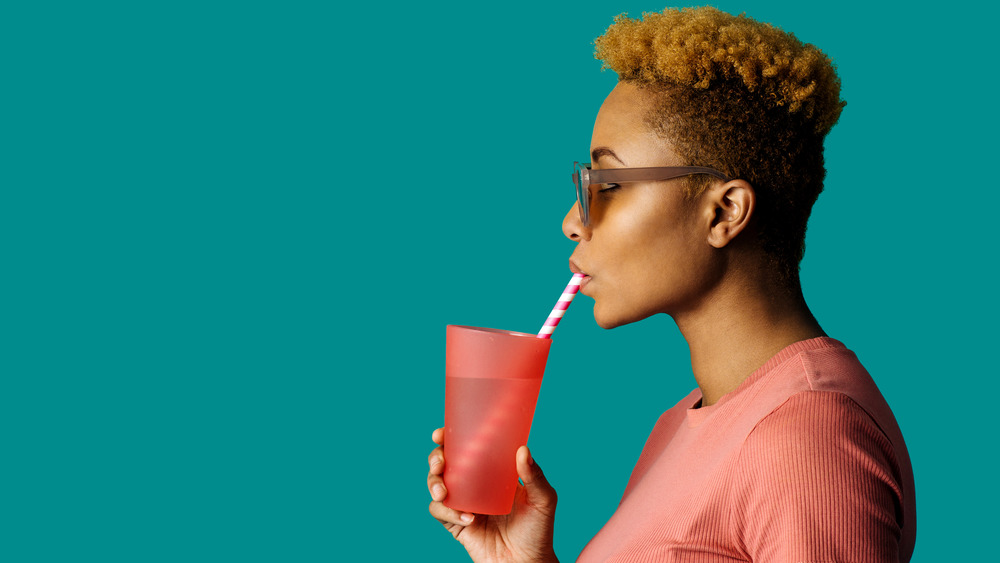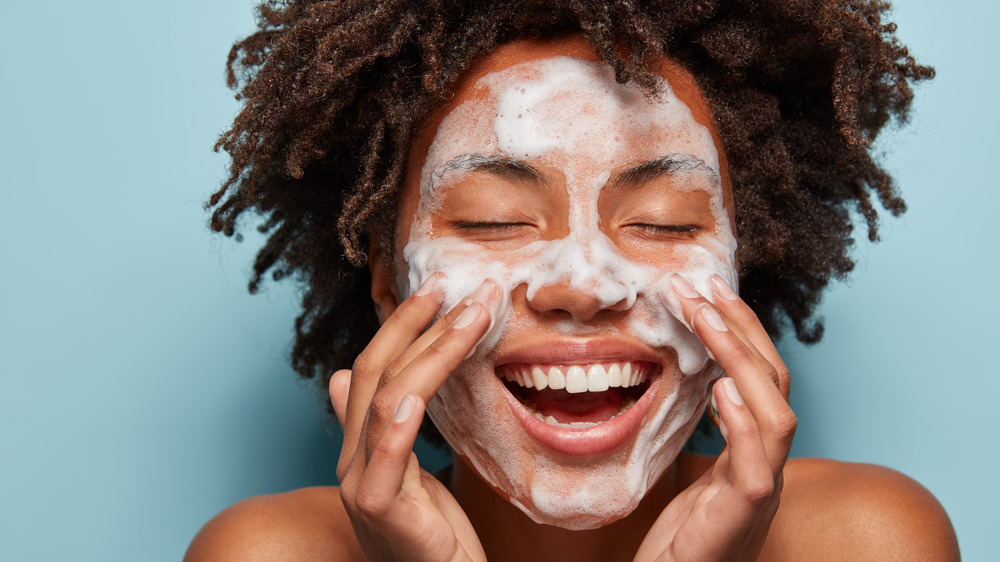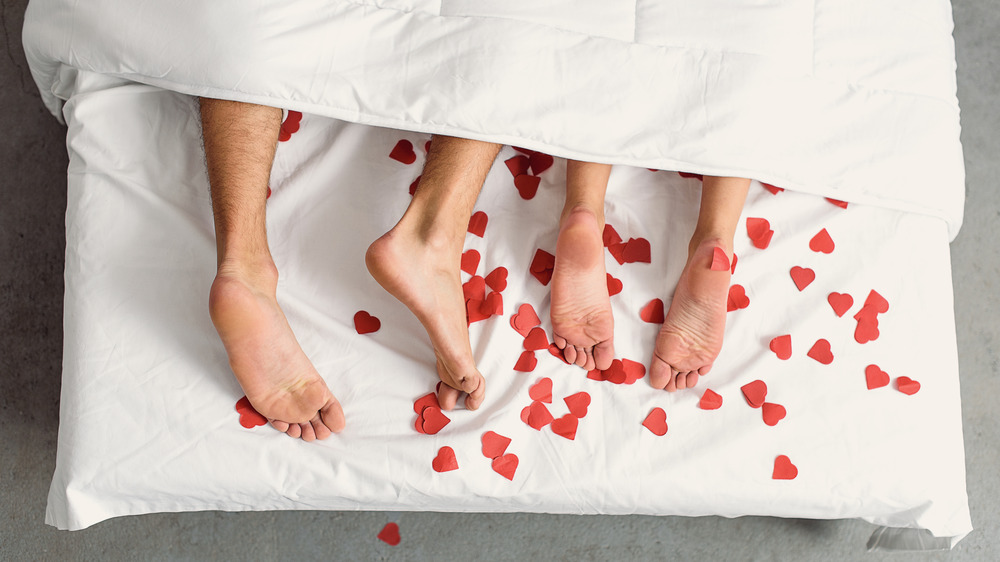When You Quit Drinking Soda, This Is What Happens To You
Sodas — the nonalcoholic, usually sweetened carbonated beverages that America has come to love — were originally sold for medicinal purposes and date all the way back to the 17th century (via Encyclopedia Britannica). As sales took off, production capabilities increased, and people began drinking the drinks as a form of refreshment in place of water. And we've never really looked back. Soda has since become a global phenomenon with sales in the billions.
By 2018, the average American was drinking more than 38 gallons of soda a year. However, that figure has been slipping over the past few years. The drink market is crowded, and soda alternatives like seltzers and coffees and teas have definitely gained in popularity. But that's not the only reason soda numbers are falling. From scientists to physicians to public health officials, a growing number of experts are also warning about the potential hazards of our favorite bubbly colas and fruit flavored pops. They warn that drinking soda promotes obesity, alters chemical and hormonal levels within the body, and drastically increases risk for disease. But is it true? Can soda really impact your health? And will giving it up improve the quality of your life? Let's see.
When you quit drinking soda, you probably won't be as dehydrated
Sipping on an ice cold soda seems like a great idea at the end of a long, hard day, but that's a mistake. Ingredients such as sugar and caffeine keep it from being absorbed into your body and hydrating your cells the way water can.
To calculate the impact of sweeteners like those found in soda, researchers in Mexico conducted an experiment on a group of thirsty rats. Some of the animals were given regular water while the others received water that had been sweetened. After four weeks, the animals drinking the sweetened water not only had more markers of dehydration in their blood, their kidneys also showed distinct signs of damage from dehydration.
Caffeine also plays a role in keeping the body dehydrated — though the impact is less severe. Douglas Casa, a professor of kinesiology, told Cooking Light that while caffeine doesn't stop the body from absorbing fluids, you don't retain quite as many fluids when you drink something that's caffeinated compared to something that isn't. Although minor, the dehydration from a caffeinated drink could be enough to impact cognitive function, mood, and vigor, he said.
Eliminate soda from your diet and your teeth will thank you
Think of the sugar in soda as an enabler when it comes to poor oral health. While the sugar itself does not harm your teeth, it does promote the development of the two biggest causes of cavities and tooth decay: bacteria and acids.
Consider that there are more than 700 different strains of bacteria living on and around the teeth in an average person's mouth. And these bacteria feed on sugar — it's what helps them grow and thrive. As bacteria multiply, they form what's known as a plaque, which is the term for a colony of bacteria. According to WebMD, some plaque adhere to teeth, allowing more bacteria to grow and ultimately producing acids which wear down tooth enamel and cause cavities. Other plaque can form around the gums, producing toxins that enter your gum tissue and cause gingivitis.
In a study of 3,541 people published in Clinical Oral Investigations, researchers in the U.K. found that a person's risk for significant tooth "wear" grew by 1.4 times for every sugary drink they consumed daily. The more wear and tear teeth experience, the greater the risk for cavities can become.
Drop soda from your life and you're also likely to drop some pounds
According to the Centers for Disease Control and Prevention, 42.4 percent of Americans are overweight. Knowing that the average American drinks more than 38 gallons of soda a year, you can start to piece together this puzzle. At 140 calories per 12-ounce can of soda, that means the average American takes in an astronomical 56,746 calories yearly just from soda alone. To put that into perspective, 56,746 calories equals 16 additional pounds that some Americans may be packing away each year simply through their daily soda habit.
Don't believe the math? In a study published in the European Association for the Study of Obesity, researchers analyzed the results of 30 different studies which sought possible links between sugar sweetened beverages such as soda and obesity. Of all the studies reviewed, 93 percent concluded there was a definitive, positive relationship for both children and adults between being overweight or obese and the consumption of sugary drinks.
When you quit drinking soda, you could lower your risk of developing diabetes
More than 100 million American adults have either diabetes or prediabetes, according to data from the Centers for Disease Control and Prevention. As these figures continue to grow, many experts believe the increased incidence of diabetes may be related, at least in part, to our insatiable thirst for soda.
One study published in the American Diabetes Association's journal, Diabetes Care, found that an extra half serving of sugary drinks like soda over four years' time was "associated with a 16% higher diabetes risk in the subsequent 4 years." Fortunately, the impact doesn't appear to be permanent. When individuals replaced soda and other sugary drinks with drinks like water, their diabetes risk went back down. In fact, swapping out just one serving a day of soda for water, coffee, or tea could lead to a 2 to 10 percent lower risk of diabetes.
Your risk for heart disease may drop significantly if you quit drinking soda
Physicians have long warned that diets high in sugar are bad for your heart. In fact, people who get 25 percent or more of their daily calories from sugar double their risk of heart disease, according to a 2014 study published in JAMA Internal Medicine.
In a separate study, researchers reviewed the diets and health records of more than 6,000 men and women over a 12-year period. According to the study, which was published in the Journal of the American Heart Association, individuals who drank soda often were more likely to develop dyslipidemia — a dangerous imbalance of cholesterol and triglycerides within the blood that potentially sets up the body to develop heart disease.
Such increased risk factors for heart disease can be deadly. One study conducted by Harvard School of Public Health found that individuals who frequently drank sugary beverages were up to 31 percent more likely to die as a result of heart disease than individuals who drank sweetened drinks more rarely (via American Heart Association).
Stop drinking soda and you'll likely experience caffeine withdrawal
If you've ever tried to kick your soda habit in the past, you know caffeine withdrawal is no joke. In fact, symptoms can be so bad doctors and psychologists recognize the withdrawal as a true disorder, just like they do withdrawal from other substances like alcohol, nicotine, or drugs.
In a review of more than 50 different studies on caffeine withdrawal conducted at American University and published in the journal Psychopharmacology, researchers found that cutting caffeine from your diet can trigger a number of unpleasant symptoms, including "headache, fatigue, decreased energy and activeness, decreased alertness, drowsiness, decreased contentedness, depressed mood," and more. While headaches are considered the most common symptom of caffeine withdrawal, hitting more than 50 percent of individuals, "flu-like symptoms, nausea/vomiting, and muscle pain/stiffness" can also be symptoms of quitting caffeine.
According to the Cleveland Clinic, people who want to break a caffeine addiction should do so gradually, rather than quitting cold turkey. Mix regular soda with a caffeine-free version so you'll get a lower dose per serving, and slowly swap in water in place of the soda when you can. This is better than taking headache medications, which are often caffeinated and can start the dependency cycle all over again.
When you quit drinking soda, your bones could become stronger
If you want to avoid frail, brittle bones as you get older, you may want to give up soda (and especially colas) now. In study after study, researchers have found that the risk of broken bones and painful fractures can increase dramatically for soda drinkers compared to non-soda drinkers. The problem appears to stem from an unfortunate pair of ingredients that most sodas contain: caffeine and phosphorus, both of which have the potential to dramatically impact bone health.
According to the National Osteoporosis Foundation, the added phosphorus in sodas can "reduce the amount of calcium that the body absorbs," significantly impacting bone health. Similarly, the group warned that consuming caffeine in high amounts like you get in soda could also potentially trigger bone loss by interfering with calcium absorption and causing a slight increase in the amount of calcium excreted from the body through the kidneys.
In one study of over 30,000 Swedish women published in Osteoporosis International, researchers discovered that four or more cups of coffee daily may cause a significant increase in the risk of broken bones, especially within people whose bodies are already low in calcium.
Your brain health may improve when you give up soda
If you're feeling a little foggier than you'd care to admit, it could be the result of the soda in your diet. In a study published in Alzheimer's & Dementia, physicians reviewed the brain health of middle-aged adults, giving them brain scans and memory tests and tracking everything they typically ate and drank. They found that the more sugary beverages the individuals regularly consumed, the worse they tended to do on memory tests. These drinkers also tended to have lower brain volume — meaning their brains appeared to have experienced at least some shrinkage as a result of their sugary habit. Reduced brain volume is one key warning sign of a potential increased risk for Alzheimer's disease later in life.
If that weren't alarming enough, a study published in Stroke found that men and women who drank diet soda daily had nearly three times the risk of developing dementia over a ten year period than individuals who rarely drank the stuff. "We recommend that people drink water on a regular basis instead of sugary or artificially sweetened beverages," Matthew Pase, a researcher behind the study and a senior fellow in the department of neurology at Boston University School of Medicine, cautioned.
Kicking your soda to the curb could help you fight acne and improve your complexion
It's time to face this ugly truth: Drinking soda can be incredibly damaging to your skin, exacerbating numerous conditions including acne and eczema (a chronic condition that causes painful redness, dryness, and itchiness within the skin). "If you are drinking a lot of soda, you are starting a whole inflammatory cascade in the body," dermatologist Steven Victor told Fox News. "When you see somebody who is having a lot of sugar, their skin doesn't look glowing or bright, it looks saggy and dull," the expert continued.
Just how definitive is the link between acne and soda? A study of nearly 8,200 college students conducted in China and published in The Journal of Pediatrics found that daily "soft drink consumption significantly increases the risk of moderate-to-severe acne in adolescents, especially when the sugar intake from any type of soft drink exceeds 100 g [3.5 ounces] per day." Victor warned that soda also has the greatest impact on the most severe form of acne, cystic acne, which is known to cause deep painful lesions and is the type of acne most likely to scar.
Quitting soda may help prevent rheumatoid arthritis
Soda consumption has also been linked to a number of common muscle problems, some potentially quite severe. According to a study in the International Journal of Clinical Practice, drinking too much cola may increase your risk for a condition called hypokalemia, which occurs when levels of potassium in the blood drop significantly. During hypokalemia, muscle function is impaired and patients may experience everything from mild weakness to serious paralysis.
Soda also appears to increase the risk for rheumatoid arthritis. A study of more than 180,000 women published in The American Journal of Clinical Nutrition found that frequent soda drinkers were up to 63 percent more likely to develop rheumatoid arthritis than those who only drank a little bit of soda once a month (via Everyday Health).
Scientists speculate that sugar in the soda may increase risk of infection, which is a precursor to the development of arthritis. Sadly, men don't fare any better. In a different study, researchers also found that soda may worsen symptoms of osteoarthritis in men. "The more sugary soda men drink, the greater the risk that knee osteoarthritis will get worse," said researcher Bing Lu, who conducted the study (via WebMD).
Giving up soda may help you reclaim your love life
The damage your favorite cola can wreak in the bedroom could be potentially massive. In a study of 2,500 young men conducted in Denmark, researchers found that "high cola (>14 0.5-L bottles/week) and/or caffeine (>800 mg/day) intake was associated with reduced sperm concentration and total sperm count."
Fertility experts at the International Society for Sexual Medicine have also warned that sweetened drinks can contribute to the development of metabolic syndrome, one of the causes of erectile dysfunction (ED). The society pointed to a study published in the Journal of Sexual Medicine, which found that "men with metabolic syndrome are 2.6 times more likely to have ED compared to healthy men."
Additionally, a study of nearly 4,000 women published in Epidemiology found that women who reported consuming at least seven servings of sugar-sweetened beverages like soda per week were also less likely to become pregnant than women drinking fewer sweetened drinks. And opting for diet soda won't help. Artificial sweeteners, especially aspartame, have been shown to dramatically impact serotonin levels in the body. While serotonin promotes happiness, low serotonin has been linked to drops in sexual performance for both men and women.
Cutting back on the amount of soda you drink could help you sleep better
If you're frequently pounding soda late at night, it may not surprise you to hear that people who sleep the least — five or less hours a night — also tend to drink the most sugary caffeinated drinks, including sodas and energy drinks. While the need to stay up during the day may drive some people to seek out sugary, caffeinated drinks, researchers at the University of California, San Francisco believe soda impairs an individual's ability to later fall asleep and reduces the quality of a person's sleep as well.
The study behind these findings, which were published in Sleep Health, involved a review of the sleep habits and beverage intake of nearly 19,000 adults. After analyzing the data they'd collected, researchers found that individuals who slept five hours or less each night consumed about 20 percent more soda and other sugary beverages on average than individuals who slept longer each night.
"We think there may be a positive feedback loop where sugary drinks and sleep loss reinforce one another, making it harder for people to eliminate their unhealthy sugar habit," said Aric A. Prather, assistant professor of psychiatry at UCSF and the study's lead author.
Quitting soda may help you to fight off wrinkles and other signs of aging
Ditching soda may just help you fight fine lines and wrinkles. That's because drinking too many caffeinated, sugary drinks has been shown to cause premature aging. Research published in the American Journal of Public Health found that drinking soda may shorten the length of structures called telomeres within your chromosomes. The shorter these telomeres are, the harder time your cells have regenerating — and the faster they age. Frequent cell regeneration is especially important within the skin, where cells tend to shed and reproduce most quickly.
Chugging too much soda may also promote a process called glycation within the body. This natural chemical reaction takes place when sugar molecules bond to proteins. According to research in the Journal of the American Dietetic Association, too much glycation can trigger the breakdown of compounds in the skin called elastin and collagen, both of which help to keep skin looking youthful. When these compounds drop in numbers prematurely, it can significantly accelerate the aging process, causing skin to lose its elasticity, sag, and become even more prone to wrinkling.
You may live longer if you quit drinking soda
Mull this over the next time you're ordering a Big Gulp: People who drink soda frequently die earlier. Yes, in a massive study of more than 450,000 people published in the Journal of the American Medical Association, researchers found that increased soda consumption can shorten the human lifespan. After tracking the study subjects' health for nearly two decades, researchers found that drinking an average of two or more glasses of soda daily dramatically increases risk of death from both digestive diseases as well as cardiovascular disease.
This isn't the only study to find such results. In another similar — and equally disturbing — study of 118,000 men and women that began in the 1980s, researchers found that the more sweetened soft drinks people consumed, the higher their overall risk for death became. In this study, published in Circulation, scientists concluded that every 12-ounce serving of soda men or women drank on a regular basis also increased their risk of death from any cause by up to 7 percent. "The optimal intake of these drinks is zero," Vasanti S. Malik, a research scientist and the study's lead author, told The New York Times. "They have no health benefits."















